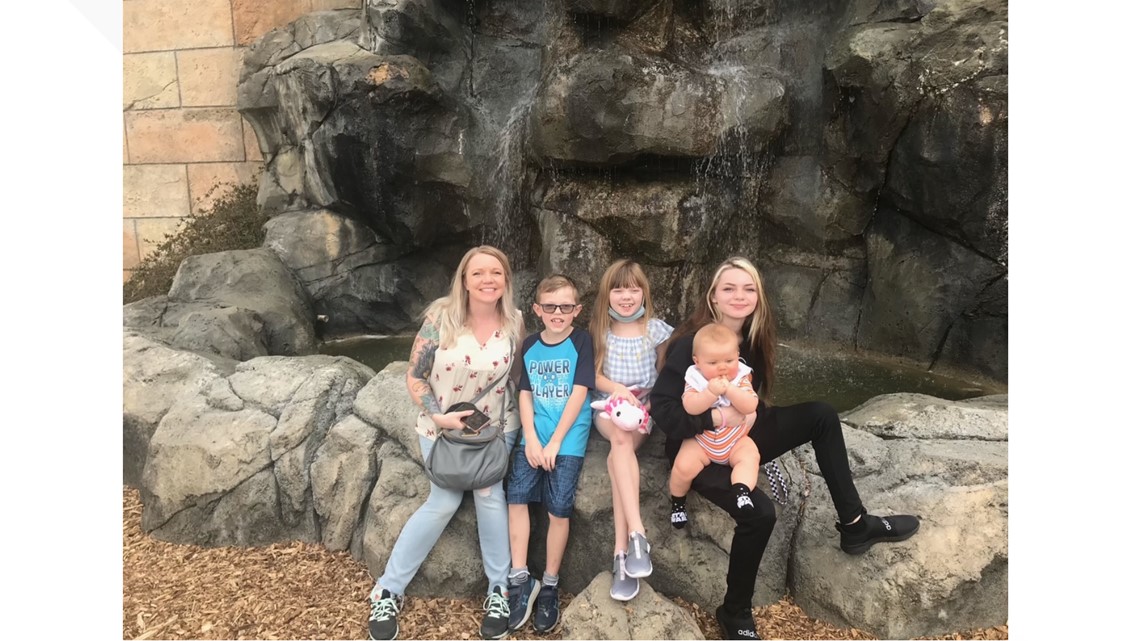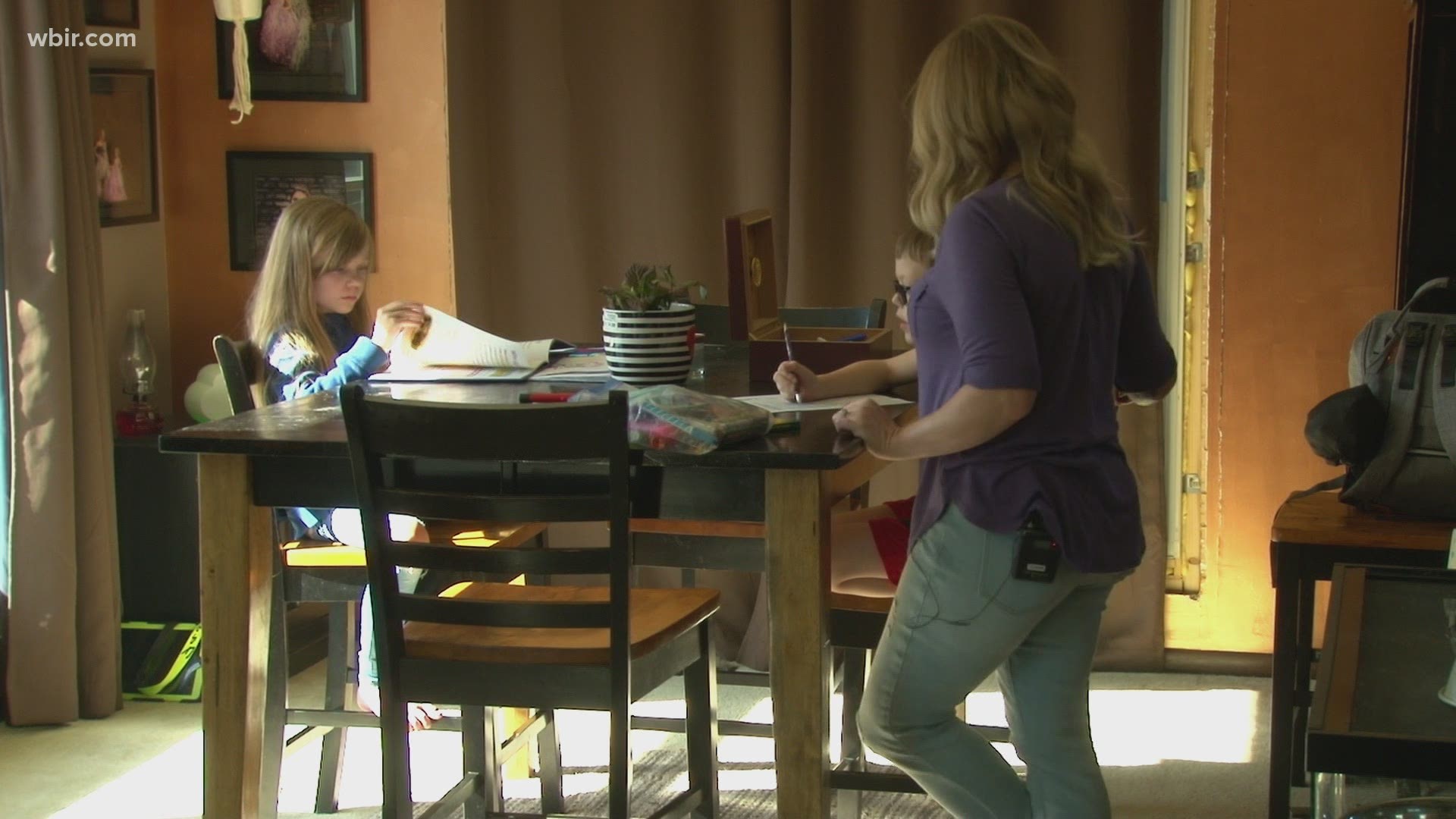KNOXVILLE, Tenn. — More than 2 million women have left the workforce since the start of the COVID-19 pandemic.
A Knoxville mother of four is one of these women, and she said she didn't have a choice.
Homeschooling was never in Jennifer Zielke's plans. She had spent 15 years climbing the ladder in the oil and gas industry.
She was 7 months pregnant with her fourth child when the pandemic closed schools across the country.
"Basically our only option was for one of us to stop working, and I made that choice. My husband makes more than I do so it was obvious which one of us was going to stay home," Zielke said.
With a sizable chunk of the family's income now gone, her family is learning to live with less, while Zielke adapts to teaching her children at home.
"It's been a huge learning curve for everyone in our household," she said. "My children have learned things that I have no idea how to do. I have never done [Common Core] math before this, and Google has been a very good friend of mine."


In January 2021, nearly 80% of all working adults who left their jobs were women, according to a study by the National Women's Law Center, a women's rights non-profit.
Of the women still working, a survey from McKinsey & Company, a management consulting company, shows 25% are considering downsizing their careers or even leaving the workforce entirely.
The current situation is a stark contrast from before the pandemic when women outnumbered men in the labor market for the first time since the Great Recession a decade ago.
Of those women left unemployed at the outset of the pandemic, nearly half are still not working.
"I believe that we're, as a society, worse off for it. We lost a lot of talent. There were people who were highly educated who left the field simply because they made less than their husbands," Zielke said.
Zielke is one of them now trying to figure out her next steps in a post-pandemic workforce.
"It took me 15 years to get into the position that I was and now that's not going to be there when I go back," she said.
While her priority is to do what she feels is best for her kids, Zielke said she and her husband have been making plans.
"My hope is, once our children are settled in a schedule, and we're not running around a million miles an hour in our head, I hope to go back to school to hopefully obtain some sort of a degree that would play out in somewhere that I can support my family like I was prior," she said.
RESOURCES
Courtney Jones, CEO of MomSource Network, a Knoxville-based organization dedicated to creating diverse and inclusive workplaces, has tips for women looking to re-enter the workforce as life gets more normal.
Q: How are employers responding? Are they hiring right now?
A: I think employers are starting to hire again, there was definitely a long period of uncertainty where companies just weren't sure if they were going to survive the pandemic, they were concerned about, how do you even hire and onboard somebody when they potentially can't come into the office, but we're starting to see, as vaccines become more readily available, and restrictions start to lift that companies are feeling more confident, and starting to hire again. So I think it's really encouraging news, especially for women who have been displaced over the last year.
Q: Time will tell how COVID changes the workplace, do you think that we'll see it become more flexible in the future?
A: I certainly hope that some of the changes that we've made over the last year will become permanent, I don't know that everybody is going to have the option to work remotely full time or permanently, like most of us have had to for the last year, I do think one thing that we know for sure is that working from home does not decrease productivity, which had been a hypothesis that employers had offered in the prior years to not doing more kind of remote teams. And I think we've certainly proven that that's not the case that you can be equally productive working from home. So I think there will be increased flexibility, what I anticipate seeing more than anything is a hybrid situation. So the opportunity to have flexibility to work remotely as needed, but not necessarily full time from home.
Q: What should women who are looking for a job right now be doing and how can they make their resume stand out?
A: I think the most important thing right now is that your job search is different now than it would have been if you'd started this a year ago, you really need to think about the impacts COVID has had on your family and potentially your work-life blend. So are you able to go into an office? And if so, what does that look like? Can you be there full time? Do you need the flexibility to work from home? What is your contingency plan? You know, if you're impacted by COVID? If you have somebody that you need to care for at home? Or if you have no virtual school that you need to consider how is that going to work? And I think really answering those questions with your family before you go on the job search. And then being really transparent with any potential employer in an interview, I think that's really, really critical is employers want to know they're going to share with you how they plan to address COVID in the workplace. And it's really important that you be open and share with them, kind of, what your plans are. As far as resume, the biggest step that I would give is make sure that it's fresh and current for every job. The biggest mistake we see people make is have that single resume that they haven't refreshed in two years and that they're circulating all over town, you really want to be considerate and thoughtful and tailor the resume to the specific opportunity you're pursuing.
Q: Are we ever going to be able to achieve the work-life balance that I think so many people are looking for right now?
A: I certainly hope for my daughter's generation, that we're not having this conversation as frequently as we are now. But I think it's particularly important that those women and those work moms are in the workforce now. Give themself the grace they deserve. This is unprecedented. None of us have ever lived through anything like this before. And so we really just need to say, you know what, this is new. This is uncharted territory. I'm gonna give myself the grace and patience, I need to kind of wobble through it. And I do believe things will be better on the other side. The other side just might not be here yet.

